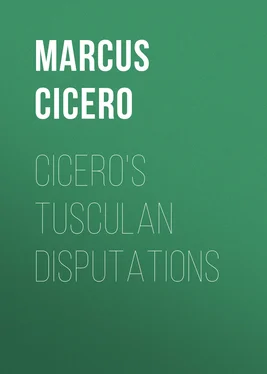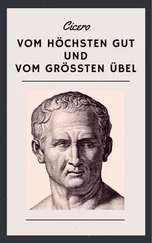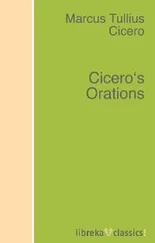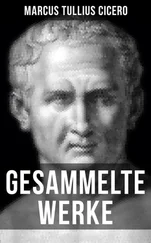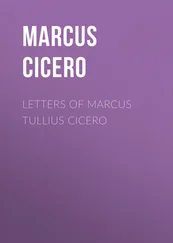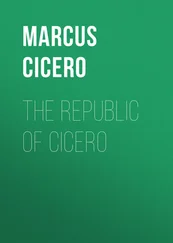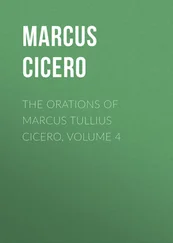Marcus Cicero - Cicero's Tusculan Disputations
Здесь есть возможность читать онлайн «Marcus Cicero - Cicero's Tusculan Disputations» — ознакомительный отрывок электронной книги совершенно бесплатно, а после прочтения отрывка купить полную версию. В некоторых случаях можно слушать аудио, скачать через торрент в формате fb2 и присутствует краткое содержание. Издательство: Иностранный паблик, Жанр: foreign_antique, Философия, foreign_edu, на английском языке. Описание произведения, (предисловие) а так же отзывы посетителей доступны на портале библиотеки ЛибКат.
- Название:Cicero's Tusculan Disputations
- Автор:
- Издательство:Иностранный паблик
- Жанр:
- Год:неизвестен
- ISBN:нет данных
- Рейтинг книги:3 / 5. Голосов: 1
-
Избранное:Добавить в избранное
- Отзывы:
-
Ваша оценка:
- 60
- 1
- 2
- 3
- 4
- 5
Cicero's Tusculan Disputations: краткое содержание, описание и аннотация
Предлагаем к чтению аннотацию, описание, краткое содержание или предисловие (зависит от того, что написал сам автор книги «Cicero's Tusculan Disputations»). Если вы не нашли необходимую информацию о книге — напишите в комментариях, мы постараемся отыскать её.
Cicero's Tusculan Disputations — читать онлайн ознакомительный отрывок
Ниже представлен текст книги, разбитый по страницам. Система сохранения места последней прочитанной страницы, позволяет с удобством читать онлайн бесплатно книгу «Cicero's Tusculan Disputations», без необходимости каждый раз заново искать на чём Вы остановились. Поставьте закладку, и сможете в любой момент перейти на страницу, на которой закончили чтение.
Интервал:
Закладка:
XXV. Should you ask what this leads to, I think we may understand what that power is, and whence we have it. It certainly proceeds neither from the heart, nor from the blood, nor from the brain, nor from atoms; whether it be air or fire, I know not, nor am I, as those men are, ashamed, in cases where I am ignorant, to own that I am so. If in any other obscure matter I were able to assert anything positively, then I would swear that the soul, be it air or fire, is divine. Just think, I beseech you: can you imagine this wonderful power of memory to be sown in or to be a part of the composition of the earth, or of this dark and gloomy atmosphere? Though you cannot apprehend what it is, yet you see what kind of thing it is, or if you do not quite see that, yet you certainly see how great it is. What, then? Shall we imagine that there is a kind of measure in the soul, into which, as into a vessel, all that we remember is poured? That indeed is absurd; for how shall we form any idea of the bottom, or of the shape or fashion of such a soul as that? And, again, how are we to conceive how much it is able to contain? Shall we imagine the soul to receive impressions like wax, and memory to be marks of the impressions made on the soul? What are the characters of the words, what of the facts themselves? and what, again, is that prodigious greatness which can give rise to impressions of so many things? What, lastly, is that power which investigates secret things, and is called invention and contrivance? Does that man seem to be compounded of this earthly, mortal, and perishing nature who first invented names for everything; 36which, if you will believe Pythagoras, is the highest pitch of wisdom? or he who collected the dispersed inhabitants of the world, and united them in the bonds of social life? or he who confined the sounds of the voice, which used to seem infinite, to the marks of a few letters? or he who first observed the courses of the planets, their progressive motions, their laws? These were all great men. But they were greater still who invented food, and raiment, and houses; who introduced civilization among us, and armed us against the wild beasts; by whom we were made sociable and polished, and so proceeded from the necessaries of life to its embellishments. For we have provided great entertainments for the ears by inventing and modulating the variety and nature of sounds; we have learned to survey the stars, not only those that are fixed, but also those which are improperly called wandering; and the man who has acquainted himself with all their revolutions and motions is fairly considered to have a soul resembling the soul of that Being who has created those stars in the heavens: for when Archimedes described in a sphere the motions of the moon, sun, and five planets, he did the very same thing as Plato’s God, in his Timæus, who made the world, causing one revolution to adjust motions differing as much as possible in their slowness and velocity. Now, allowing that what we see in the world could not be effected without a God, Archimedes could not have imitated the same motions in his sphere without a divine soul.
XXVI. To me, indeed, it appears that even those studies which are more common and in greater esteem are not without some divine energy: so that I do not consider that a poet can produce a serious and sublime poem without some divine impulse working on his mind; nor do I think that eloquence, abounding with sonorous words and fruitful sentences, can flow thus without something beyond mere human power. But as to philosophy, that is the parent of all the arts: what can we call that but, as Plato says, a gift, or, as I express it, an invention, of the Gods? This it was which first taught us the worship of the Gods; and then led us on to justice, which arises from the human race being formed into society; and after that 37it imbued us with modesty and elevation of soul. This it was which dispersed darkness from our souls, as it is dispelled from our eyes, enabling us to see all things that are above or below, the beginning, end, and middle of everything. I am convinced entirely that that which could effect so many and such great things must be a divine power. For what is memory of words and circumstances? What, too, is invention? Surely they are things than which nothing greater can be conceived in a God! For I do not imagine the Gods to be delighted with nectar and ambrosia, or with Juventas presenting them with a cup; nor do I put any faith in Homer, who says that Ganymede was carried away by the Gods on account of his beauty, in order to give Jupiter his wine. Too weak reasons for doing Laomedon such injury! These were mere inventions of Homer, who gave his Gods the imperfections of men. I would rather that he had given men the perfections of the Gods! those perfections, I mean, of uninterrupted health, wisdom, invention, memory. Therefore the soul (which is, as I say, divine) is, as Euripides more boldly expresses it, a God. And thus, if the divinity be air or fire, the soul of man is the same; for as that celestial nature has nothing earthly or humid about it, in like manner the soul of man is also free from both these qualities: but if it is of that fifth kind of nature, first introduced by Aristotle, then both Gods and souls are of the same.
XXVII. As this is my opinion, I have explained it in these very words, in my book on Consolation. 19 19 This treatise is one which has not come down to us, but which had been lately composed by Cicero in order to comfort himself for the loss of his daughter.
The origin of the soul of man is not to be found upon earth, for there is nothing in the soul of a mixed or concrete nature, or that has any appearance of being formed or made out of the earth; nothing even humid, or airy, or fiery. For what is there in natures of that kind which has the power of memory, understanding, or thought? which can recollect the past, foresee the future, and comprehend the present? for these capabilities are confined to divine beings; nor can we discover any source from which men could derive them, but from God. There is therefore a peculiar 38nature and power in the soul, distinct from those natures which are more known and familiar to us. Whatever, then, that is which thinks, and which has understanding, and volition, and a principle of life, is heavenly and divine, and on that account must necessarily be eternal; nor can God himself, who is known to us, be conceived to be anything else except a soul free and unembarrassed, distinct from all mortal concretion, acquainted with everything, and giving motion to everything, and itself endued with perpetual motion.
XXVIII. Of this kind and nature is the intellect of man. Where, then, is this intellect seated, and of what character is it? where is your own, and what is its character? Are you able to tell? If I have not faculties for knowing all that I could desire to know, will you not even allow me to make use of those which I have? The soul has not sufficient capacity to comprehend itself; yet, the soul, like the eye, though it has no distinct view of itself, sees other things: it does not see (which is of least consequence) its own shape; perhaps not, though it possibly may; but we will pass that by: but it certainly sees that it has vigor, sagacity, memory, motion, and velocity; these are all great, divine, eternal properties. What its appearance is, or where it dwells, it is not necessary even to inquire. As when we behold, first of all, the beauty and brilliant appearance of the heavens; secondly, the vast velocity of its revolutions, beyond power of our imagination to conceive; then the vicissitudes of nights and days, the fourfold division of the seasons, so well adapted to the ripening of the fruits of the earth, and the temperature of our bodies: and after that we look up to the sun, the moderator and governor of all these things; and view the moon, by the increase and decrease of its light, marking, as it were, and appointing our holy days; and see the five planets, borne on in the same circle, divided into twelve parts, preserving the same course with the greatest regularity, but with utterly dissimilar motions among themselves; and the nightly appearance of the heaven, adorned on all sides with stars; then, the globe of the earth, raised above the sea, and placed in the centre of the universe, inhabited and cultivated in its two opposite extremities, one of which, the 39place of our habitation, is situated towards the north pole, under the seven stars:
Читать дальшеИнтервал:
Закладка:
Похожие книги на «Cicero's Tusculan Disputations»
Представляем Вашему вниманию похожие книги на «Cicero's Tusculan Disputations» списком для выбора. Мы отобрали схожую по названию и смыслу литературу в надежде предоставить читателям больше вариантов отыскать новые, интересные, ещё непрочитанные произведения.
Обсуждение, отзывы о книге «Cicero's Tusculan Disputations» и просто собственные мнения читателей. Оставьте ваши комментарии, напишите, что Вы думаете о произведении, его смысле или главных героях. Укажите что конкретно понравилось, а что нет, и почему Вы так считаете.
